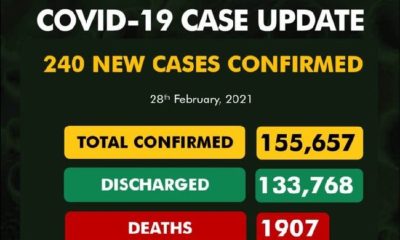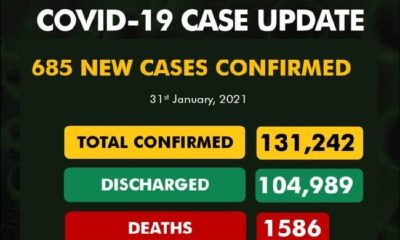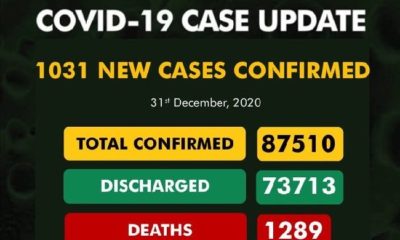Nigerian Newspapers
Nigeria, Hezbollah and tomorrow
Dawit Giorgis, a visiting fellow at Foundation for Defense of Democracies, in this article for the CNN, traces the root causes of the country’s security challenges and why terrorist cells may well remain in Nigeria
Nigerian authorities last month arrested four Lebanese nationals in northern Nigeria on suspicion of having ties with Hezbollah. After a raid on one of their residences yielded a stash of weapons, including anti-tank weapons, rocket propelled grenades, and anti-personnel mines, the Nigerian State Security Services (SSS) announced that the compound was hosting a terrorist cell tied to the Lebanese Shia movement. The four accused have denied the charges, and are suing the government for wrongful detention. But even if they are found guilty, other Hezbollah nodes may well remain in Nigeria. The truth is that despite the thousands of miles that separate Nigeria from Lebanon, the country is faced with a growing threat from a Hezbollah doppelganger.
The Islamic Movement in Nigeria (IMN) is a jihadist organisation with strong support among the 5 million Shia Muslims, by some estimates, living in Nigeria. Founded in the early 1980s, it has flourished with cash, training and support from Iran. Indeed, the roots of the IMN can be traced to the immediate aftermath of the 1979 Iranian revolution, when Nigerian students belonging to the Muslim Student Society traveled to the Islamic Republic and were trained with the goal of establishing an Iranian-style revolution in Nigeria.
The leader of the student group was Sheikh Ibrahim Zakzaky, a firebrand Sunni turned Shia religious extremist who was first influenced by the works of Sayyd Qutb, the intellectual force behind Egypt’s Muslim Brotherhood and whose ideas form the basis of al Qaeda’s ideology today. Remarkably, Zakzaky switched sides and became an adherent of Shia Islam, encouraged by Iranian funding and training, both religious and military.
Since becoming the leader of the IMN in the mid-1980s, Zakzaky has had numerous confrontations with the government, including being imprisoned for nine years. From 1981 to 1984, for example, he was jailed for sedition and for declaring he would recognize no governmental laws or authority except those of Islam.
Fast forward three decades, and Zakzaky is the patriarchal spiritual leader of Shiites in Nigeria, much like Ayatollah Ruhollah Khomeini was in Iran. When he addresses his followers, Zakzaky typically sits under a big portrait of Ayatollah Khomeini and wields rhetoric akin to that of Hezbollah’s Hassan Nasrallah. The subject of his speeches are what you might expect – heated vitriol aimed at Jews and Israel, in which he portrays Jews as infidels who should be wiped off the map by Allah. In 1998, for example, the Shiites of Nigeria, under Zakzaky’s leadership, observed Jerusalem Day, mirroring Khomeini’s introduction of a day for expressing solidarity with the Palestinians. He also talks about social justice in Nigeria and building support for Iran’s policies in Africa.
“Iran’s objectives are to establish a local power base to exert influence over the national government and to act against Western interests,” argues Abel Assadina, a senior Iranian diplomat who defected in 2003.
Certainly, under Zakzaky’s leadership, the IMN has provided Hezbollah-style military training to hundreds of Nigerians in camps throughout Northern Nigeria. And although the group has yet to launch an attack, it is surely not unreasonable to expect an attempt at some point. As Muhammad Kabir Isa, a senior researcher at Nigeria’s Ahmadu Bello University, told the BBC: “when you embark on military drills, you are drilling with some sort of anticipation. Some sort of expectation.”
And the IMN’s propaganda effort also bears a striking resemblance to that of Hezbollah. The movement has had a thriving newspaper, al-Mizan, for more than two decades. In addition, it has also begun broadcasting its own internet-based Hausa radio station, Shuhada, on the country’s main air waves, similar to Hezbollah’s radio station, Al-Nour. IMN also has plans to start a new TV channel, a move reminiscent of Hezbollah’s al-Manar.
Isa has described the movement as “a state within a state.” But this does not mean that IMN is isolated from Nigeria. Indeed, Zakzaky has reportedly worked to ensure that his members are recruited into the army, the police force and the state security establishment.
Of course it is true that however much inspiration he likes to draw from images of Nasrallah, he lacks the Hezbollah leader’s battlefield experience. And he also does not have Nasrallah’s resources – Hezbollah has recently dispatched thousands of fighters to back the al-Assad regime in Syria.
Yet the recent arrest of alleged Hezbollah operatives, and a stash of weapons, so far from home raises troubling questions about what Zakzaky’s network might be capable of – and what exactly he has planned.
————————————————————————————————————————-
Posted in Nigerian Newspapers. A DisNaija.Com network.
Source: The Nation Newspaper
DisNaija.Com publishes regular posts on Nigeria News, Nigerian Newspapers, Online Nigeria Gist.
Follow us on Twitter and Facebook.
Nigerian Newspapers
Follow @Dis_Naija
Your Opinion Counts. Be sure To Leave A Comment, If You Have Any.
Please Like, Share or Tweet. Your Support Is Appreciated.
This Day
Military, Police Ring Abuja to Forestall Boko Haram Attack
•Deploy more personnel as army chief vows to wipe out terror group
•Security beefed up at N’Assembly
Deji Elumoye and Kingsley Nwezeh in Abuja
Abuja, Nigeria’s seat of power, is under a massive security cordon following threats of attacks by insurgents and the increasing wave of banditry in the contiguous states of Kaduna, Kogi, Nasarawa and Niger States, THISDAY’s investigation has revealed.
There has been a wave of kidnappings in the outskirts of the federal capital, notably Pegi, Tuganmaje and Kuje among others, which the police have battled in recent times.
The security situation in and around the Federal Capital Territory (FCT) was heightened by the pronouncement of the Niger State Governor, Mr. Sani Bello, that Boko Haram fighters who he said sacked 50 villages in the state and hoisted the terror group’s flag, were about two hours drive away from the FCT.
Security has also been beefed up at the National Assembly as operatives, yesterday, thoroughly screened every vehicle approaching the National Assembly complex in Abuja.
The deteriorating security situation nationwide prompted the National Chairman of the Peoples Democratic Party (PDP), Prince Uche Secondus, to warn that the 2023 general election may not hold, demanding the declaration of a state of emergency as well as the convocation of a national conference.
However, the Chief of Army Staff, Lt. Gen. Ibrahim Attahiru, yesterday restated the Nigerian Army’s determination to annihilate Boko Haram.
But the Governor of Katsina State, Hon. Bello Masari, cautioned against declaring a state of emergency, saying doing so isn’t the solution to combat the security challenges facing the country.
The security of the nation’s airports was also in focus yesterday as the Office of the National Security Adviser (ONSA) said there was no threat to them.
THISDAY’s investigations showed increased presence of troops, police, Nigerian Security and Civil Defence Corps (NSCDC) personnel and intelligence operatives at the three strategic entrances to the city notably, Keffi, Zuba and Gwagwalada.
More checkpoints were also mounted around Gwagwalada and Keffi.
THISDAY also observed increased intelligence deployment at the entrance and the borders of FCT with contiguous states.
Beyond the borders, there were more deployments and police patrols inside the city and increased intelligence deployments as well.
Security sources told THISDAY: “There are deployments here and there but they are routine. Alertness is key to a secure environment.”
It was also learnt that security agencies were involved in frenzied meetings throughout yesterday.
The meetings, coordinated by the office of the Chief of Defence Staff under the new joint operational strategy of the armed forces, were aimed at coordinating a joint response to possible threats of attack to the FCT.
“I understand the security teams have been meeting for some days now and if you look around you, you will notice that there are increasing patrols and numbers of security personnel. The threats are not been taken lightly,” a source said.
National Assembly workers, lawmakers and visitors also had a harrowing experience accessing the legislative complex due to heightened security in the area.
Security operatives thoroughly screened every vehicle approaching the National Assembly complex in Abuja, impeding both human and vehicular traffic.
The Sergeant-at-arm of the National Assembly and other security agencies supervised the operations, leading to huge traffic build-up inside the complex.
Legislative staff, visitors and lawmakers were seen patiently waiting for their cars to be searched so that they could go ahead with the business of the day.
Some staff and visitors at some point got tired of waiting and were seen alighting from their cars to trek from the gate to the complex.
Meanwhile, the ONSA has said there is no threat to the nation’s airports.
A statement by the Head of Strategic Communication, Mr. Zachari Usman, said the reports of threats to the airports were an internal correspondence of security threat assessment misconstrued as security threat to the airports.
PDP Demands State of Emergency
In a related development, the PDP National Chairman, Prince Uche Secondus, yesterday demanded the declaration of a state of emergency, warning that the 2023 general election might not hold if the federal government failed to tackle insecurity.
He called on the federal government to summon a national conference to address the spike in insecurity.
Secondus added that the national caucus of the party will meet today to discuss the state of the nation.
Addressing members of the National Executive Committee (NEC) in Abuja, Secondus said: “We are worried Abuja is not even safe. It is no longer politics. We got alert of plots to bomb and burn down our airports.
“We urge the federal government to declare a national state of emergency in security. There is the need to call a national conference to discuss the insecurity in the country.
“There may not be any election in 2023 in Nigeria due to insecurity. This government must listen to the people. The Buhari government should call a national confab to discuss security and state of the nation. It is no longer politics. This time we are not playing politics. Let’s keep politics aside and move the nation forward.”
He said the country had been grounded, regretting that there had been no matching response from the federal government.
Secondus said in the past, terrorism in the North was confined to the North-east, but with the report of Boko Haram occupying villages in Niger State, terrorism had spread to the North-central
“Herdsmen are also menacing in the West; gunmen causing havoc in the East; and the militants in the South; all killing, looting, raping, maiming and burning down homes. The situation is bad; Nigerians all over are living in fear,” he said.
The Senate Minority Leader, Senator Enyinnaya Abaribe, said the problem of Nigeria was outside of the PDP headquarters, while pledging the support of the Senate to the declaration of state of emergency in security.
Abaribe said he deliberately decided not to speak on the floor of the Senate but to allow the APC senators to speak so as to avoid being accused of giving a partisan colouration to the issue of insecurity.
He stated that only electoral reforms would give victory to the opposition party in the 2023 general election and ensure a democratic defeat of the APC-led federal government.
Also, the Minority Leader of the House of Representatives, Hon. Ndudi Elumelu, commended the NEC and the PDP leadership for their collective efforts at resolving the House leadership crisis.
The NEC meeting adopted the position of Secondus, calling on the federal government to convoke a national conference to discuss the state of insecurity in the country, according to a communiqué read by the National Publicity Secretary, Mr. Kola Ologbondiyan.
Army Chief Vows to Wipe Out Boko Haram
The army yesterday reiterated its commitment to wipe out Boko Haram.
Chief of Army Staff (COAS), Lt. Gen. Ibrahim Attahiru, told reporters in Maiduguri, Borno State that Boko Haram had been defeated in many encounters and would continue to be defeated until it’s annihilated from Nigeria.
“We will take on Boko Haram decisively, and we are committed to the focus of the operations, which is the total annihilation of Boko Haram from Nigeria,” he said.
The COAS, who was visiting the headquarters of Operation Lafiya Dole in Maiduguri for the fifth time since his appointment four months ago, said the visit was to boost the morale of the troops, reassure them and listen to any issues affecting them.
Earlier, the Theatre Commander of Operation Lafiya Dole, Maj. Gen. Farouq Yahaya, lauded the visit, which he said had continued to boost the morale of the troops.
“We are honoured, we are grateful, we are encouraged by those visits. You provided us guidance, logistics and other things we required. We are most grateful for those visits,” Yahaya said.
State of Emergency Won’t Solve Security Challenges, Says Masari
Katsina State Governor, Hon. Aminu Masari, has, however, said declaration of a state of emergency won’t solve the security challenges facing the nation.
Masari, who spoke yesterday with journalists after meeting with the Chief of Staff to the President, Prof. Ibrahim Gambari at the State House, Abuja stated that he was against the recent call by the House of Representatives for the declaration of a state of emergency in the security sector as it would not solve the problem.
According to him, declaring a state of emergency will not achieve the desired effect as the security structure and personnel to be used to execute the emergency are already overstretched in a bid to safeguard lives and property.
Sourced From: THISDAYLIVE
Tribune
Nigeria records 55 new COVID-19 infections, total now 165,110
Tribune Online
Nigeria records 55 new COVID-19 infections, total now 165,110
The Nigeria Centre for Disease Control (NCDC) has recorded 62 new cases of COVID-19, bringing the total number of infections in the country to 165,110. The NCDC disclosed this on its official Twitter handle on Friday. “55 new cases of #COVID19Nigeria; Lagos-21, Yobe-19, Ogun-6, Akwa Ibom-3, Kaduna-2, Plateau-2, FCT-1, Rivers-1.” YOU SHOULD NOT MISS THESE HEADLINES FROM NIGERIAN TRIBUNE COVID-19: Nigeria Recorded […]
Nigeria records 55 new COVID-19 infections, total now 165,110
Tribune Online
Sourced From: Tribune Online
Premium Times
Insecurity: Lagos bans occupation of abandoned buildings
The government said that no worker should stay back beyond 6:00 p.m. within premises of buildings undergoing construction.
The post Insecurity: Lagos bans occupation of abandoned buildings appeared first on Premium Times Nigeria.
Sourced From: Premium Times Nigeria
The Nation
UFC: Usman gets N584m after beating Masvidal
Kamaru Usman has raked in a mammoth £1.1million, about N584.2 million after his impressive knockout victory over Jorge Masvidal on Saturday night, Sportivation.com.ng reports.
The Nigerian Nightmare has been handsomely rewarded for his stunning performance and he was the best-paid fighter on the card which was witnessed by 15, 000 fans in Florida.
According to Daily Mail, Usman earned £538,000 to show up, £459,000 pay-per-view bonus, a £43,000 sponsorship bonus and a well deserved £35,000 Performance of the Night bonus.
Jorge Masvidal also earned £358,000 to show, £186,000 in pay-per-view money and a £28,000 sponsorship bonus.
This is the biggest payday of Usman’s career so far and the Welterweight champion also benefited from the fact that Masvidal is also a top draw for the fans.
Kamaru Usman is a Nigerian-American professional mixed martial artist, former freestyle wrestler and graduated folkstyle wrestler.
Sourced From: Latest Nigeria News, Nigerian Newspapers, Politics




















